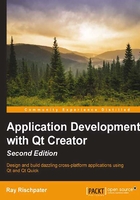
Downloading Qt and Qt Creator
Qt, the cross-platform toolkit behind Qt Creator, has had a long and illustrious history. Presently a project of Digia, it has its own URL at has both commercial and non-commercial licenses. To get started with the non-commercial version for free, go to http://qt-project.org/downloads to see something similar to what the following screenshot shows:

Downloading Qt Creator
Tip
One of the most popular platforms for application development with Qt is Linux. On many Linux variants—notably Ubuntu, my personal favorite—you can get Qt Creator using the package manager. On my Ubuntu box, Qt Creator is just a sudo apt-get install qtcreator command away. You'll get a version of Qt that matches your flavor of Linux, although it might not be the latest and greatest build from Digia.
By following the link and downloading Qt, you should now have Qt, Qt Creator, and the MinGW toolkit for developing software on Windows. If you're developing on Linux or Mac, the process will be similar, although it won't include MinGW.
Some downloads include the C++ compiler and the linker that you need for your development, while others don't. For example, on Windows, there's a variant that includes the MinGW tool chain, so you have everything you need to build applications. However, you can also download Qt Creator for Windows that uses the Microsoft Visual Studio compilers. So, if you prefer using Visual Studio for your compilation and Qt Creator as your IDE, this is also an option. On Mac OS X, you'll need to have Xcode and the command-line development tools installed first; you can download Xcode from the Mac OS X App Store and then use Xcode to download the command-line development tools.
Once the installer downloads, run it in the usual way. It'll launch an installation wizard for your platform, and installation should typically take about 3 to 4 minutes. You'll want to have plenty of disk space. Qt Creator doesn't consume that much disk space, but software development does; figure at least 500 MB for the tools and libraries, and budget a few gigabytes free on your main drive for your source code, intermediate object files, debugging symbols, and of course, your compiled application. (It is especially important to plan for this if you're running Qt Creator on a virtual machine; make sure that the virtual hard drive for your virtual machine image has plenty of disk space.)
You should also ensure that your development box has plenty of RAM; the more the better. Qt Creator runs happily on 2 GB of RAM, but the compiler and linker used by Qt Creator can run a lot faster if they have more RAM available.